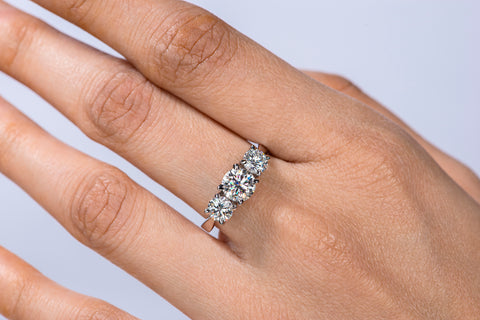THE BEAUTY AND SIGNIFICANCE OF JEWELRY: EXPLORING WHY WE WEAR IT?

Since ancient times, jewelry has been a part of human culture. Jewelry has always been a form of self-expression and a way to adorn the human body, from the straightforward shell necklaces worn by ancient people to the intricate designs of contemporary diamond rings.
But why do we wear jewelry? What is it about these small, shiny objects that makes us want to wear them every day, to special occasions, or as an everyday accessory?
In this blog, we will discuss some of the most common reasons why people wear jewelry. There are a few different reasons why people wear jewelry.
SELF EXPRESSION & IDENTITY

One of the most common reasons people wear jewelry is to show off their individuality and express themselves. Jewelry can be an accessory that reflects a person's personality, taste, and individuality, as well as a means of self-expression. This is especially true for people who wear items that are one-of-a-kind or personalized, like an engraved necklace or a ring with a birthstone.
Jewelry can help people feel more connected to their cultural or ethnic identity, in addition to allowing them to express themselves. In some cultures or regions, for instance, certain kinds of jewelry may be worn to honor one's heritage. Bangles, for instance, are a symbol of marriage in Indian culture and are frequently worn by women to indicate their marital status.
SOCIAL STATUS & WEALTH

Jewelry has been used as a way to show wealth and social status throughout history. Diamond and gold jewelry, for example, have long been associated with status and luxury. Putting on jewelry of this kind can show other people that you can afford it.
Jewelry may be given as a gift to commemorate significant occasions, such as a marriage, promotion, or graduation, in some cultures. Jewelry is not only a tangible item in these situations but also a representation of the giver's love, appreciation, and support.
SPIRITUAL & RELIGIOUS SIGNIFICANCE

For some people, jewelry can also hold spiritual or religious significance. Jewelry can be worn to honor spiritual beliefs or symbols that are regarded as sacred or that represent them. For instance, many Christians wear a cross necklace to represent their faith because the cross is a common Christian symbol.
In some cultures, jewelry is also worn to bring luck and protection from evil spirits. In many cultures, protective jewelry like amulets, talismans, and other types have been worn for centuries to bring good fortune and ward off evil forces.
SENTIMENTAL VALUE

Lastly, people may hold a lot of sentimental value for jewelry. A piece of jewelry could be a family heirloom that has been passed down through the generations and carries the stories and memories of one's ancestors with it. A piece of jewelry, such as an engagement ring or a graduation present, may also have sentimental value because it was a gift from a loved one or a reminder of a significant life event.
These times, jewelry is more than just a physical thing; it's also an emotional thing that carries with it the stories, experiences, and feelings of the people who wore it in the past.





